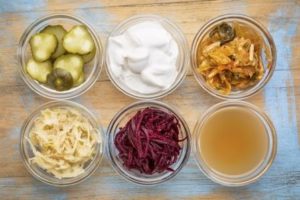 Probiotics may seem like one of those new health trends, but actually, they’ve been around since the ancient times! Probiotics have been defined as microorganisms, either bacteria or yeast, which are alive and have to be used in a specific dose and should have a proven benefit on health.
Probiotics may seem like one of those new health trends, but actually, they’ve been around since the ancient times! Probiotics have been defined as microorganisms, either bacteria or yeast, which are alive and have to be used in a specific dose and should have a proven benefit on health.
Here’s a short timeline on how probiotics have become well-known in various cultures, and eventually, into the health scene.
Ancient eras
Prehistoric accounts give us a clue on how probiotics were unwittingly prepared and consumed by the early people. When our early ancestors caught too much food, they had to find a way to store it. The fermentation process, in particular, promotes the growth of microorganisms on food. This then enriches the food with probiotics. Fish, for example, was found to keep well when packed with rice. Unknowingly, the bacteria from the rice enriched the fish with probiotics.
The early centuries
In the 13th century, the famous Marco Polo mentioned drinking fermented beverages that were probiotic-rich, such as kefir.
In the 1800’s, science began to catch on. Louis Pasteur was able to identify the microorganisms involved in fermentation. Taking things further, in 1905, a Russian biologist named Elie Metchnikoff connected these microorganisms to health benefits. He found that people who consumed more yogurt and other fermented foods lived to be as old as 100!
The 1900’s
In the 1950’s, the term “probiotics” was first coined by bacteriologist Werner Kollath. Studies on such microorganisms spurred further research on their health benefits. The following decades until the 1980’s saw a better understanding of probiotics, which were then known to help intestinal microbial balance. Thus, probiotics were started to be used as supplements.
The 1990’s saw American awareness and acceptance of probiotics. The 21st century then saw a boom in probiotic supplements that the US-FDA had to increase regulation on such supplements.
This was followed by an interest in how probiotics can benefit the gut health, and how they might benefit chronic GIT conditions.
Today, we see probiotics in a variety of forms. They fill grocery and pharmacy shelves in the form of many-flavored drinks, various commercial foods, powders and capsules. Some even come in chocolate or as sprinkles you can place on your food!
Knowing what we know right now, experts say that it’s still best to take probiotic supplements in particular situations. For example, they can be beneficial if you want to prevent antibiotic side effects or avoid a case of travel-related diarrhea.
But because every individual has his or her own microbiome profile, the best route to take is to eat healthy fermented foods and those that your bacteria can utilize. This includes yogurt, kimchi, and foods rich in fiber. A good diet that promotes health gut bacteria may do more for you than taking probiotic supplements.
You can read a more detailed timeline of probiotics from: http://edition.cnn.com/2017/07/13/health/probiotic-foods-explainer/index.html





